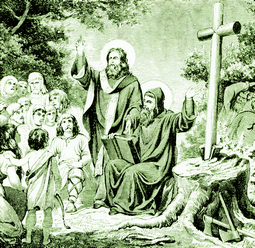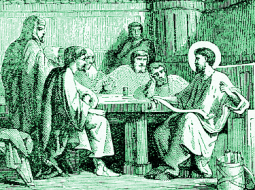July 7th - Sts. Cyril and Methodius and St. Pantaenus
Jul 7, 2019 22:18:54 GMT
Post by Elizabeth on Jul 7, 2019 22:18:54 GMT

Saints Cyril and Methodius
Apostles to the Slavic Nations
(†ca. 867 and †ca. 887)
(†ca. 867 and †ca. 887)
These two brothers were born in Thessalonica of a senatorial family. Saint Cyril was sent to Constantinople to study, where he became known as the Philosopher; but it was the Holy Church that he desired to serve, and he was ordained a priest. While Cyril was still young, the Patriarch of Constantinople recommended in the year 848 to the reigning Emperor to place him at the head of a mission which was to be sent to the Khazars of the eastern Danube region. Their king desired to learn of Christianity and had requested missionaries. Cyril asked for the time to learn the Turkish language which this people spoke, and after only a short while was ready to preach. The prince of the Khazars received Baptism and the entire nation soon followed his example. Cyril founded churches and furnished them with excellent ministers, then returned to Constantinople, refusing all presents offered him by his converts.
He was next missioned to Bulgaria with his younger brother Methodius, who was a monk of eminent sanctity. This nation, which had migrated like the Khazars from the east, had settled in the Moldavian region and a part of Hungary; they had been exposed to Christianity by some Greek prisoners, and the sister of their king had become a Christian by the good offices of the empress Theodora. When Saint Methodius, an excellent artist, was delegated to paint in the palace for the king, as he requested, a scene which could frighten the beholders, he chose for subject the Last Judgment. The king was so impressed that after being instructed he was baptized, in 865, with forty-eight of his followers. The nation followed their leaders after a brief revolt had been promptly quieted.
The two brothers preached also in Moravia, invited there by the pious king of that nation, whom they baptized with most of his subjects. It was there that Saint Cyril invented a Slavonic alphabet, translating the Bible and other writings from Greek and Latin into the language of the Slavic peoples. In 867 the missionaries went to Rome, where Saint Cyril, who was ill, died soon afterwards.
Saint Methodius was named bishop of Moravia and Pannonia or Hungary. Difficulties were not lacking, but he remained there until 880, when he returned to Rome to justify his conduct, which certain enemies had accused to the Pope. The Pope cleared him before the adversaries, and settled some questions regarding the language to be used in worship. He permitted the Mass to be said in the Slavic language, not to the exclusion, however, of Latin. Saint Methodius also baptized the king of the Bohemians, and again many of the king's subjects followed his example. The Saint lived for about 20 years after his brother's decease; the exact date of his death is unknown.

Saint Pantænus
Doctor of the Church and Apostle to the Indies
(† 214)
Doctor of the Church and Apostle to the Indies
(† 214)
This learned Doctor and apostolic man flourished in the second century. Born in Sicily, he was a Hebrew Christian who had studied Holy Scripture and also Greek philosophy. His esteem for virtue had led him into an acquaintance with the Christians, and being charmed with the innocence and sanctity of their conversation, he opened his eyes to the truth. It was under the disciples of the Apostles that he studied Holy Scripture in the orient, before his thirst for sacred learning brought him to Alexandria in Egypt, where the disciples of Saint Mark had instituted a celebrated school of Christian doctrine.
Pantænus did not seek to display his talents in that center of literature and commerce; but his great progress in sacred learning was discovered, and he was drawn out of the obscurity in which his humility had sought to bury itself. He was placed at the head of the Christian school some time before the year 179. His learning and excellent manner of teaching raised the school's reputation above all schools of the philosophers, whom he strove to win to Christianity. The lessons which he read and commented, gathered from the prophets and Apostles, conveyed light and knowledge into the minds of all his hearers.
The Indian traders who came to Alexandria entreated Saint Pantænus to pay their country a visit and vanquish false philosophy by the true faith. He was advised by the bishop of Alexandria to consent, and therefore left the school and went to preach the Gospel to the eastern nations. In India he found some seeds of the faith already sown, and there he was shown the Gospel of Saint Matthew in Hebrew, which according to Eusebius' account in his History of the Church, was taken there by Saint Bartholomew. He brought it back with him to Alexandria, where he returned after he had zealously employed several years in instructing the Indians in the faith. Saint Pantænus continued to teach privately until about the year 214, when he closed a noble and excellent life by a holy and happy death.
